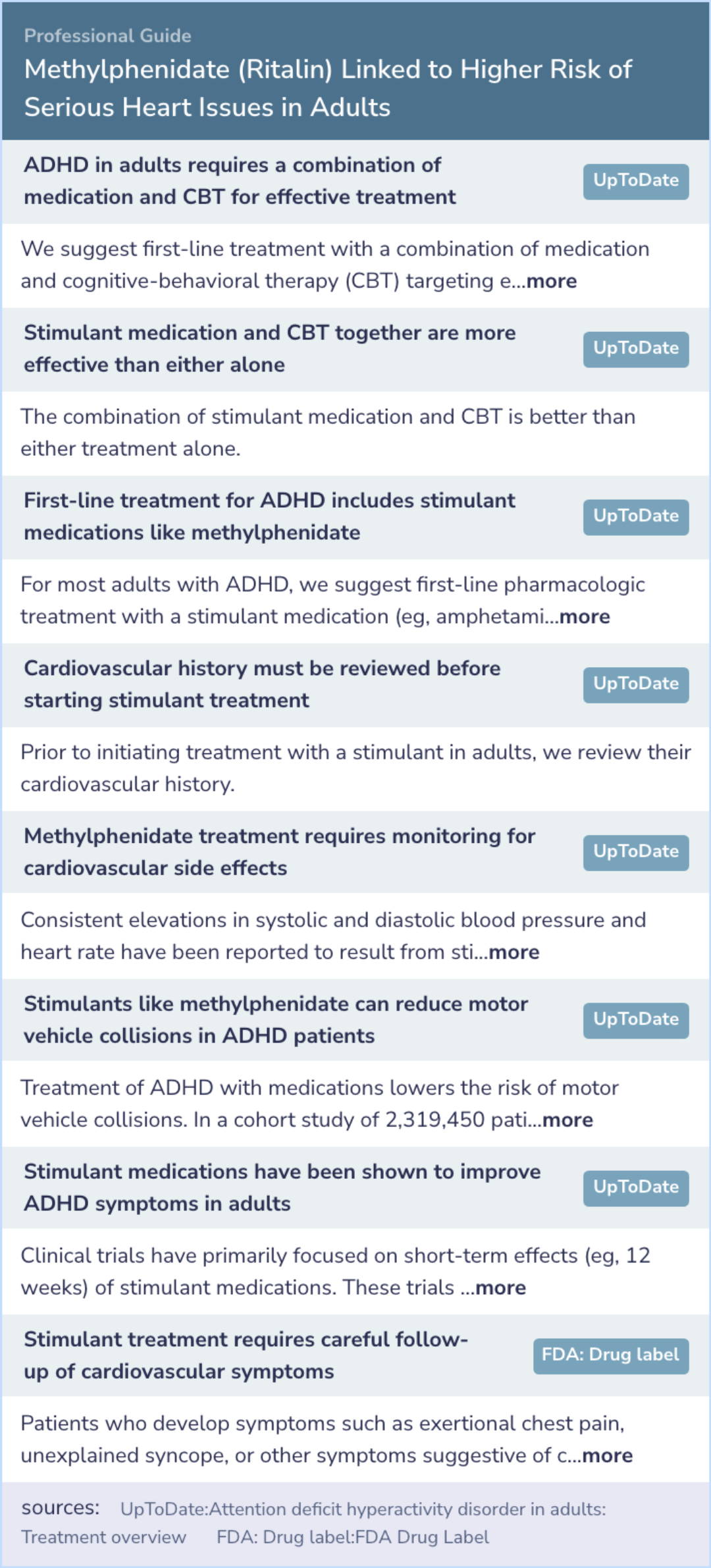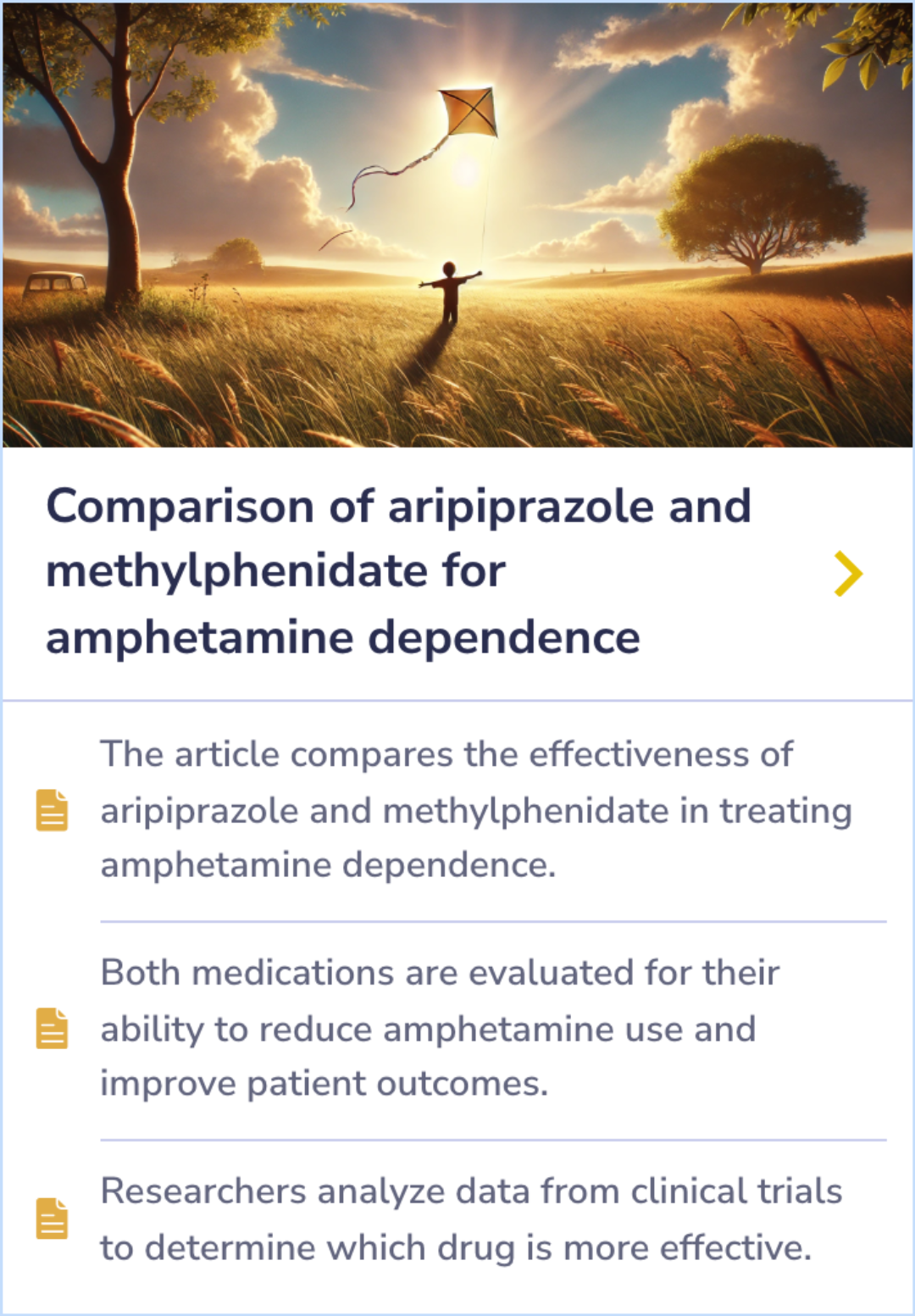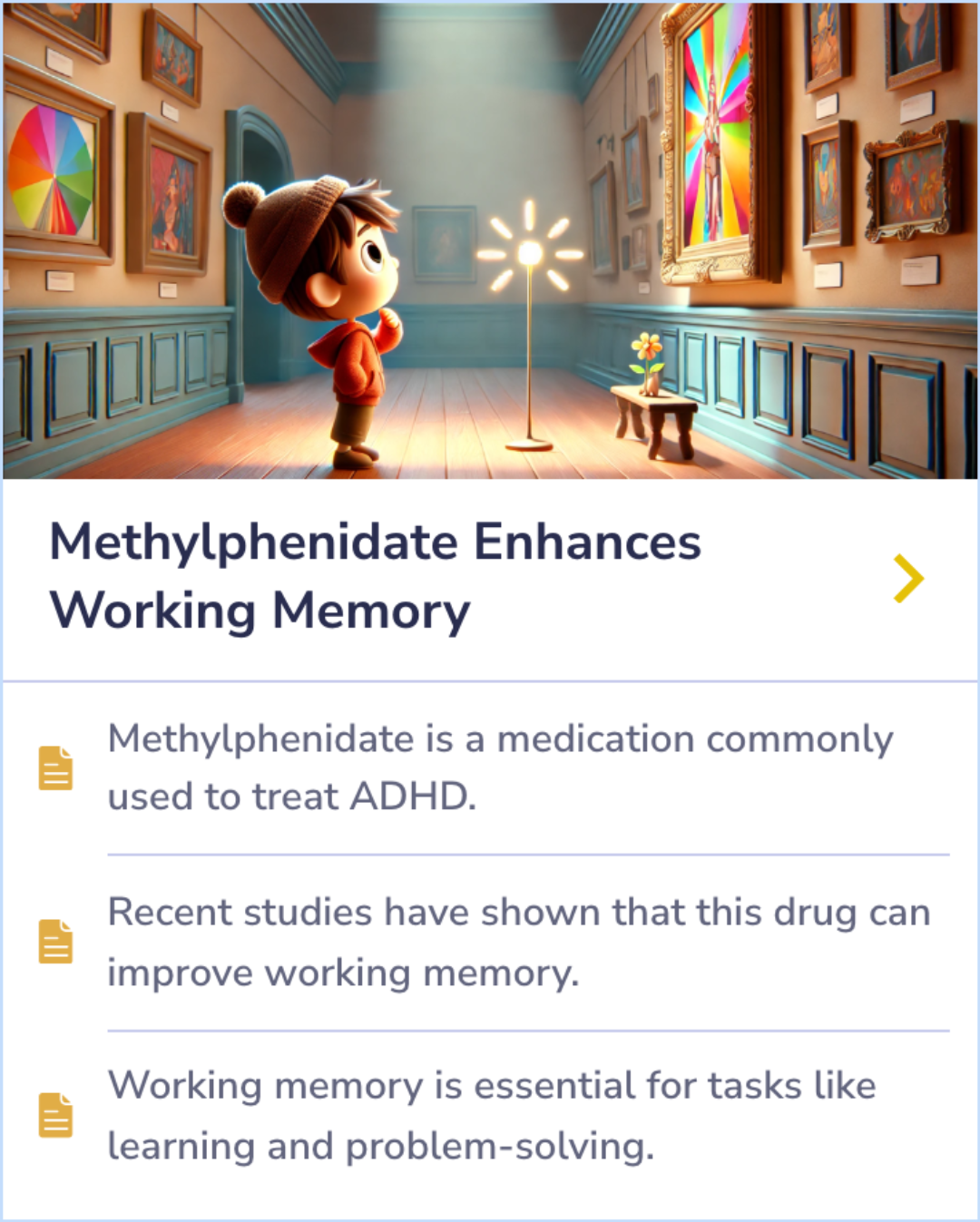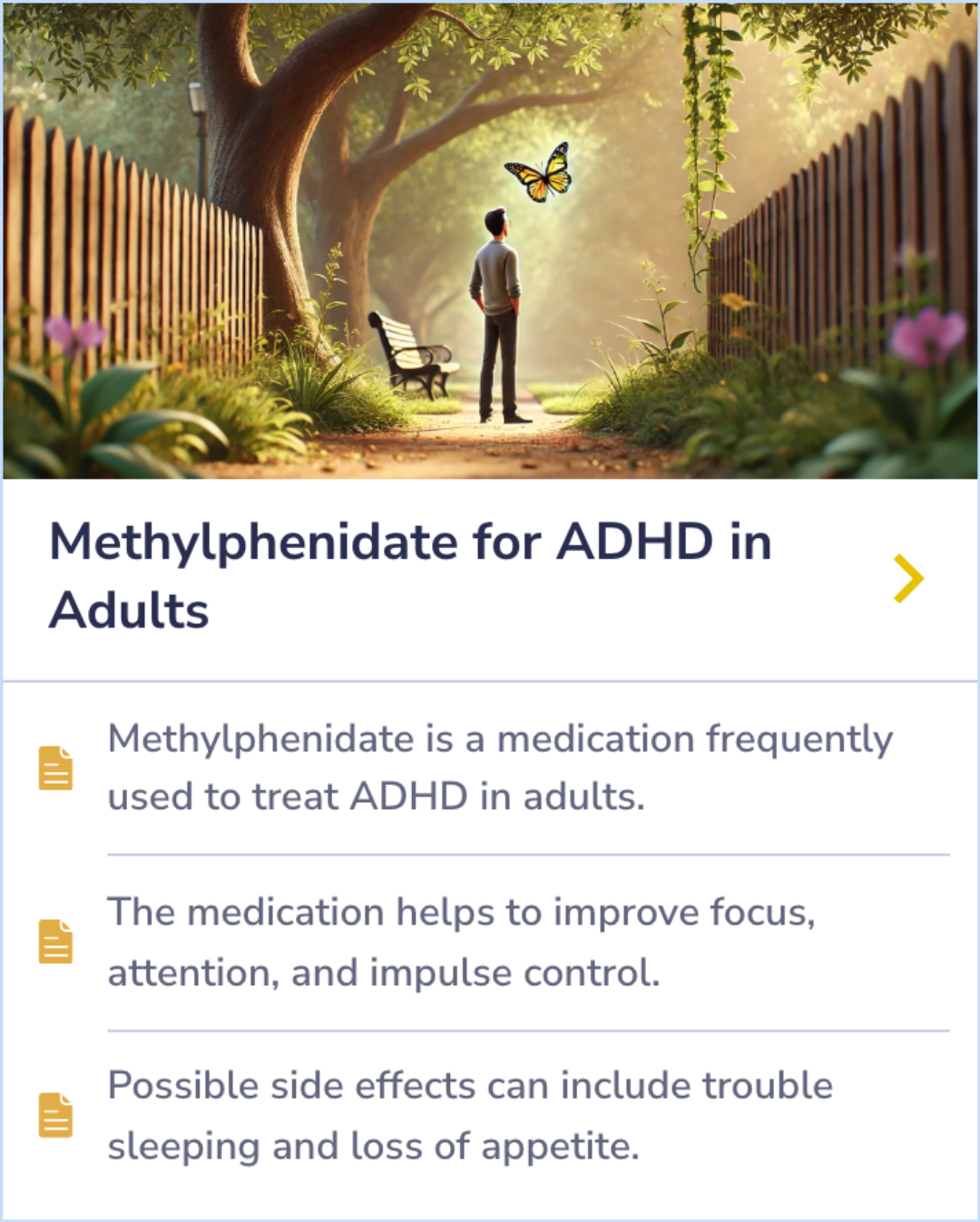Ritalin Paper Database
Visual Abstract
Methylphenidate and risk of serious cardiovascular events in adults
Methylphenidate (Ritalin) Linked to Higher Risk of Serious Heart Issues in Adults
October 17, 2024
author
Schelleman H, Bilker WB, Kimmel SE, Daniel GW, Newcomb C, Guevara JP, Cziraky MJ, Strom BL, Hennessy S
journal
Am J Psychiatry
Date Published
February 2012
Why link to a visual abstract?
What is a visual abstract?
Original
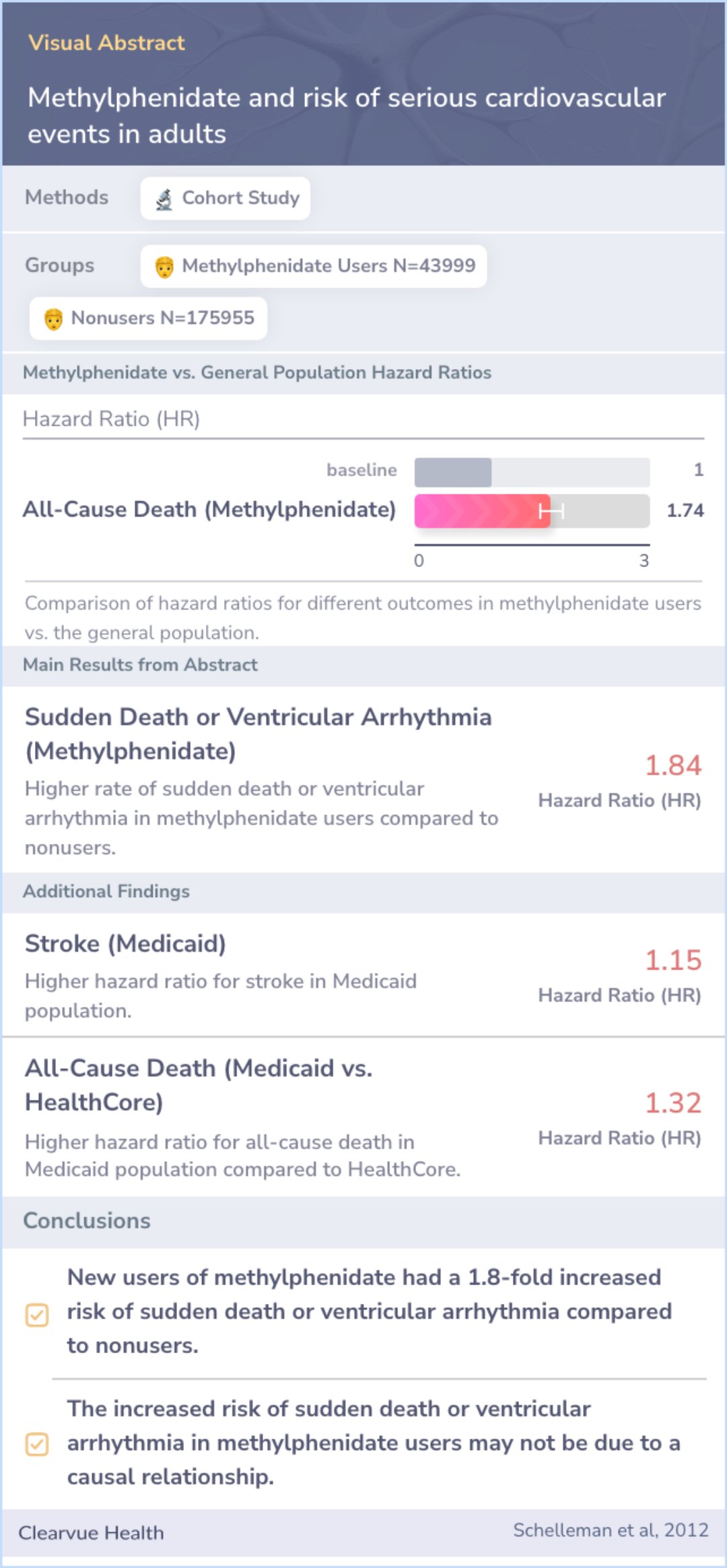
Study Summary
🔬
What They Studied
The researchers aimed to determine if methylphenidate (Ritalin) use in adults is linked to higher rates of serious cardiovascular events compared to nonusers.
💡
What They Found
They found that new users of methylphenidate had a 1.8-fold increased risk of sudden death or ventricular arrhythmia, but there was no dose-response relationship, suggesting it may not be causal.
📚
What This Means
These findings indicate a possible association between methylphenidate use and an increased risk of sudden death or ventricular arrhythmia, although it may not be causative.
Study Summary
Study Overview
The study highlights concerning heart health risks linked to ADHD medications, particularly methylphenidate, known as Ritalin. As more adults, including the elderly, rely on these drugs for ADHD symptoms, health officials worry about their impact on heart rate and blood pressure. Researchers sought to determine if Ritalin could lead to severe heart events, such as sudden death or irregular heartbeats. Notably, findings suggest that starting Ritalin could nearly double these risks compared to non-users. This raises important safety questions for adults, especially those with pre-existing heart conditions.However, the narrative extends beyond mere association. The complexity of results is significant, as researchers found no clear connection between dosage and risks for serious cardiovascular events. This invites further investigation into whether the heightened risks arise directly from the medication or other underlying health issues among users. Various confounding factors, like unmeasured lifestyle choices, could impact results. Thus, while the research sparks vital discussions on ADHD medication safety, it underscores the need for further studies to grasp the full scope.
Abstract: background
The authors sought to determine whether use of methylphenidate in adults is associated with elevated rates of serious cardiovascular events compared with rates in nonusers.

Public Health Concern
"There is substantial public health concern about the cardiovascular safety of ADHD medications in adults."
Link to Serious Events
"In this study, initiation of methylphenidate (Ritalin) was associated with nearly a doubling of the rate of sudden death or ventricular arrhythmia."
Importance of Further Research
"Our results suggest that preexisting cardiovascular disease and treatment for a cardiovascular disease were more prevalent in methylphenidate (Ritalin) users than in nonusers."
Study Summary
Methods
Researchers conducted a cohort study using Medicaid data from five states and commercial insurance data from 14 states. They focused on new adult methylphenidate users enrolled in their insurance plans for at least 180 days, comparing them with matched non-users based on factors like state, sex, and age. This matching helped isolate medication effects from other variables. The study involved 43,999 new methylphenidate users and 175,955 non-users, focusing on health outcomes such as sudden death, ventricular arrhythmia, stroke, heart attack, and their combinations.
Abstract: methods
This was a cohort study of new users of methylphenidate based on administrative data from a five-state Medicaid database and a 14-state commercial insurance database. All new methylphenidate users with at least 180 days of prior enrollment were ident...more

Study Summary
Results
The study revealed a higher incidence of sudden death or irregular heartbeats among methylphenidate (Ritalin, Concerta) users, with rates of 2.17 per 1,000 person-years compared to 0.98 per 1,000 person-years in non-users. This corresponds to an adjusted hazard ratio of 1.84, indicating nearly double the risk for users. Importantly, researchers noted that higher doses did not correlate with increased risks, raising questions about underlying causes for the observed increase. For strokes and heart attacks, differences between users and non-users were not statistically significant, suggesting no clear medication-related risk.
Abstract: results
The age-standardized incidence rate per 1,000 person-years of sudden death or ventricular arrhythmia was 2.17 (95% CI=1.63-2.83) in methylphenidate users and 0.98 (95% CI=0.89-1.08) in nonusers, for an adjusted hazard ratio of 1.84 (95% CI=1.33-2.55)...more
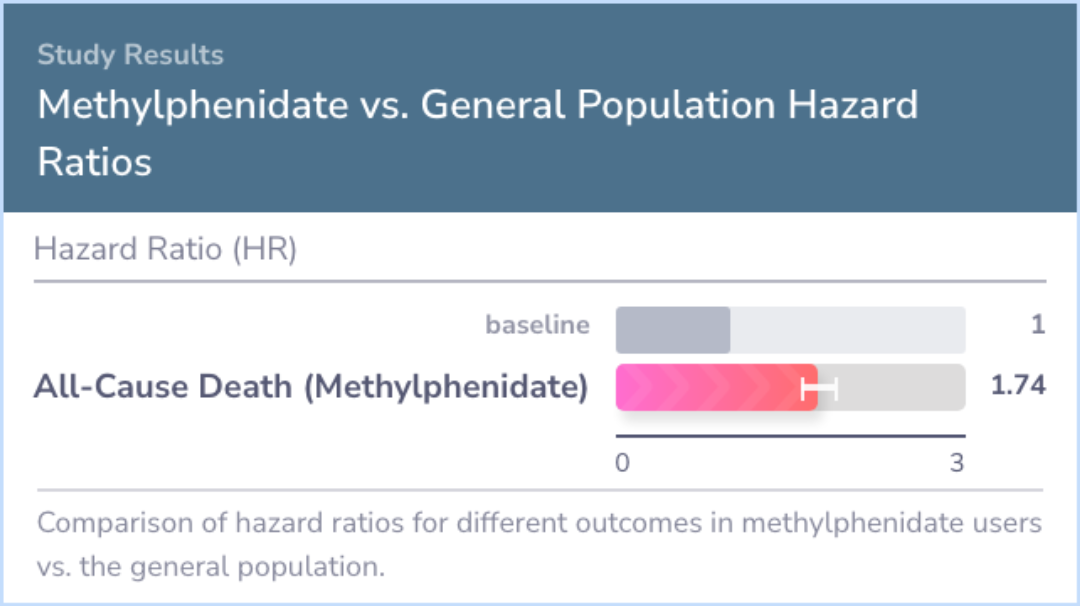
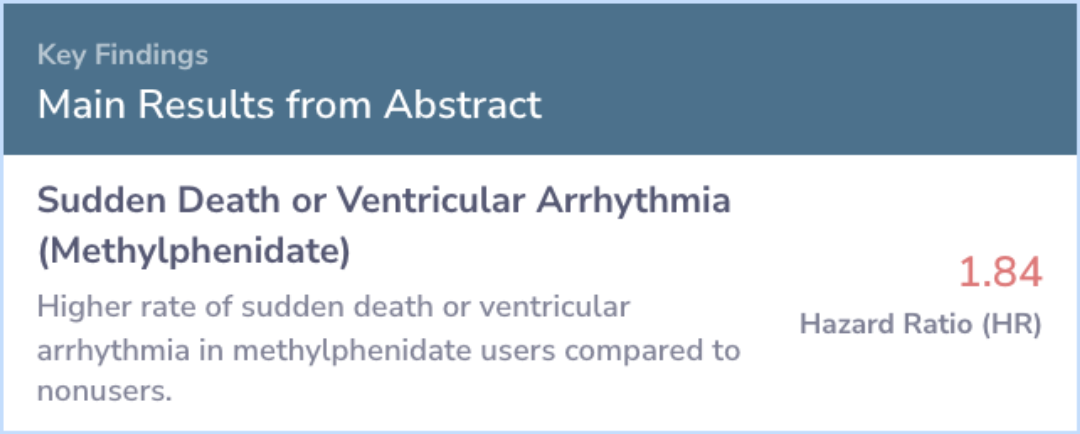
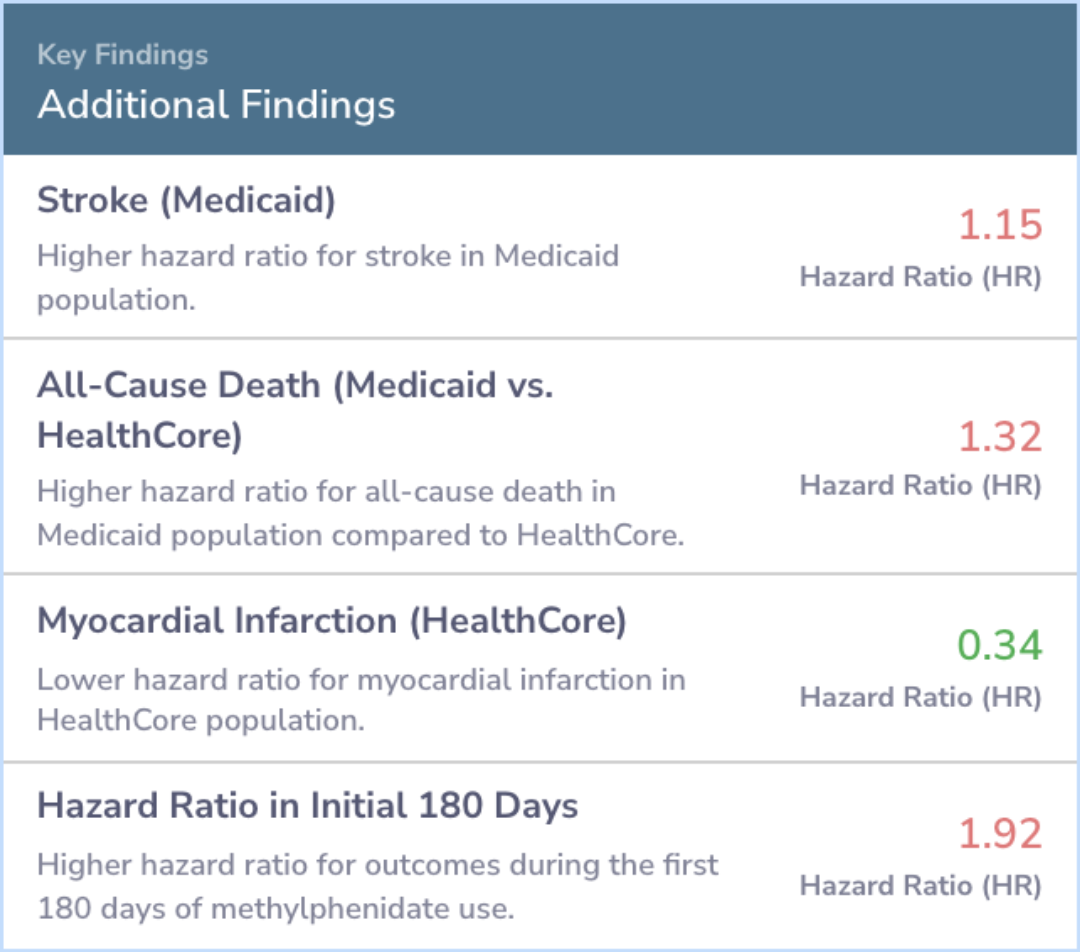
Study Summary
Conclusions
Starting methylphenidate (Ritalin, Concerta) appears linked to nearly double the risk of sudden death or serious heart rhythm abnormalities. However, the absence of a clear dose-response relationship leaves uncertainty regarding methylphenidate as the direct cause of these outcomes. Further research is needed to elucidate the nature of this association. The study points to a potential concern but does not definitively establish causality between methylphenidate use and increased cardiovascular events.
Abstract: conclusions
Although initiation of methylphenidate was associated with a 1.8-fold increase in risk of sudden death or ventricular arrhythmia, the lack of a dose-response relationship suggests that this association may not be a causal one.
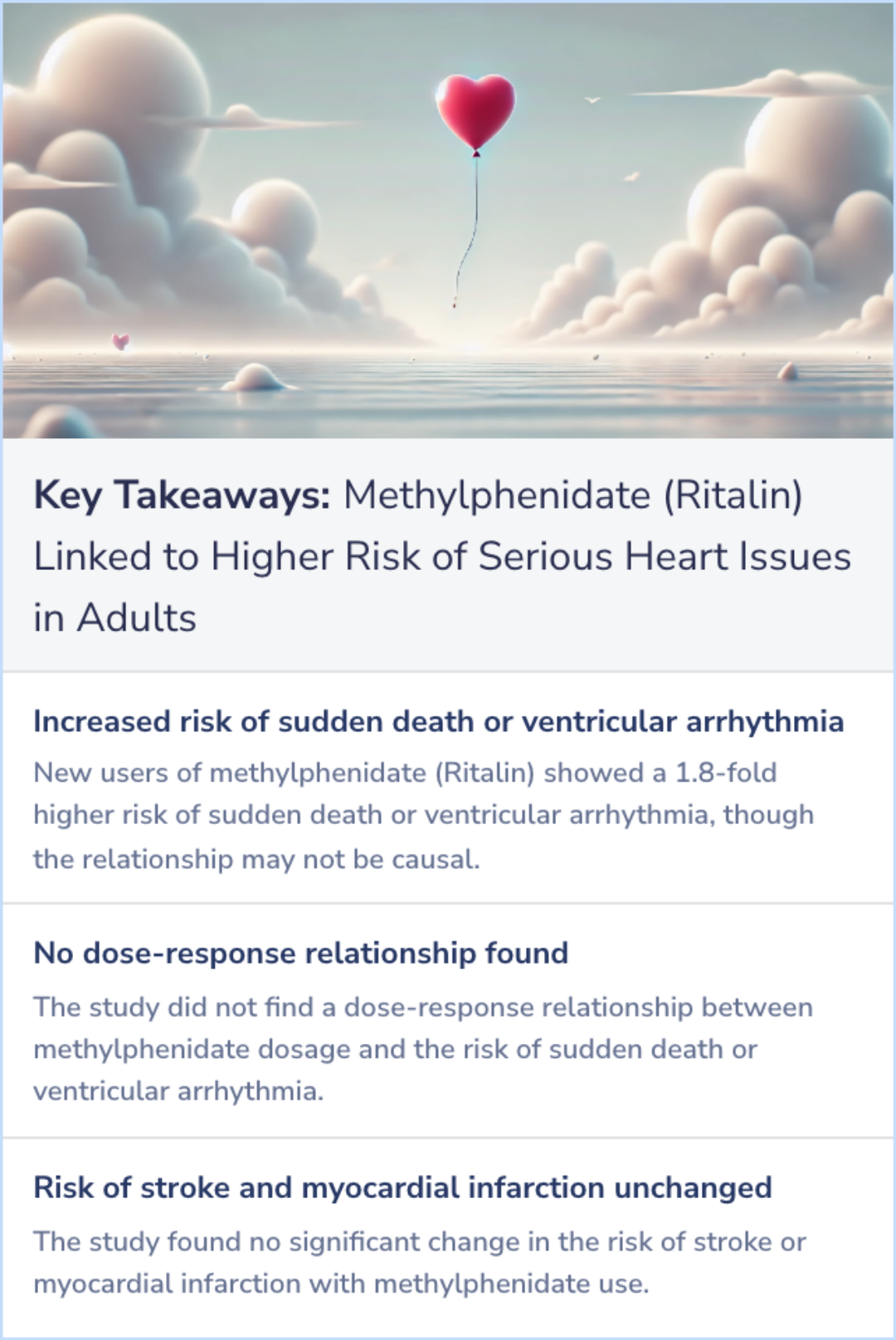
Background Information
Patient Guide
❤️
Primary Uses and Risk Factors
Methylphenidate, FDA-approved for ADHD in adults, can exacerbate cardiovascular symptoms like palpitations.
🧠
Action Mechanism
Blocks norepinephrine and dopamine reuptake, increasing concentrations in the synaptic cleft. Impacts heart activity.
🧬
Metabolism
Liver metabolism to ritalinic acid primarily through de-esterification. Watch for varied metabolic reactions.
❤️
Cardiovascular Risks
Not recommended for patients with serious heart conditions due to the potential for aggravated symptoms.
👀
Side Effect Monitoring
Requires regular monitoring for cardiovascular issues, psychiatric reactions, and other side effects.
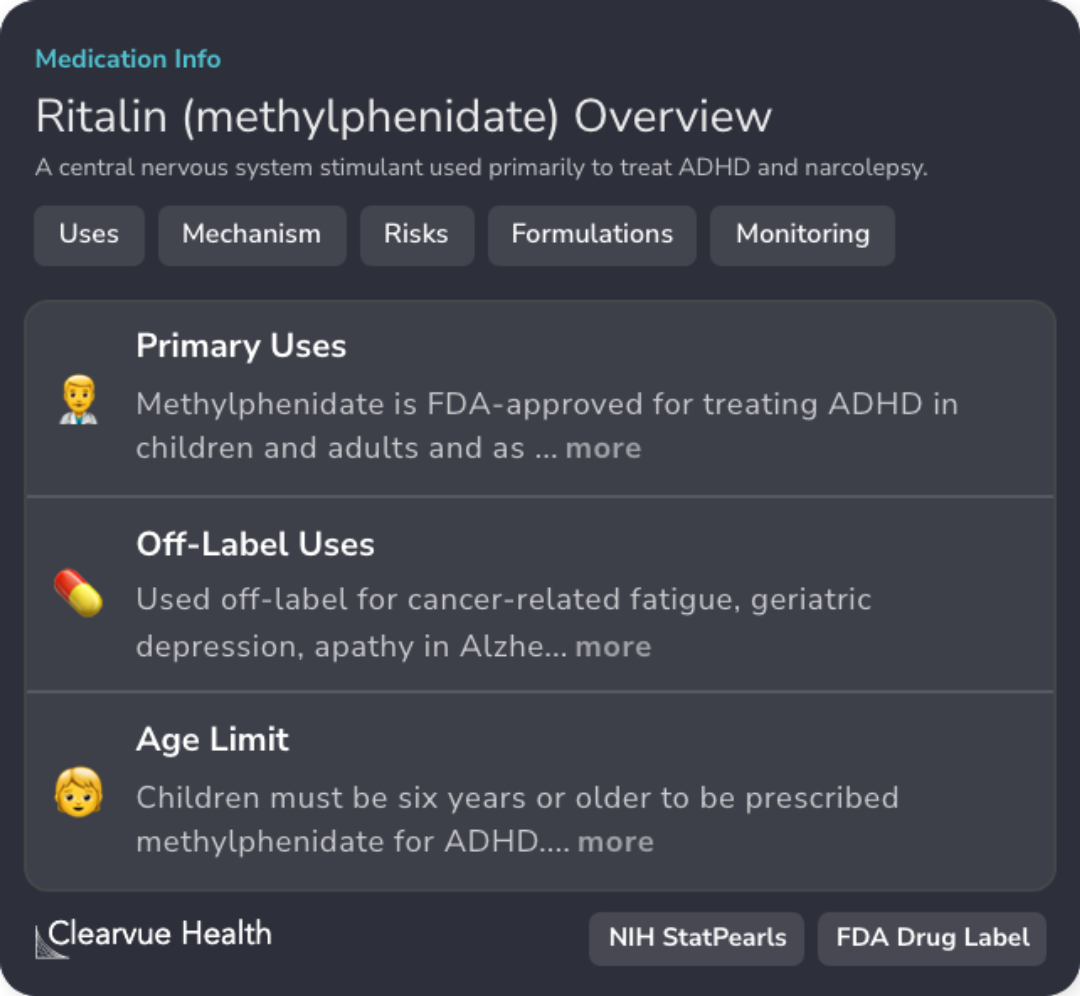
Professional Guide
Expert Opinion: Methylphenidate (Ritalin) Linked to Higher Risk of Serious Heart Issues in Adults
The findings indicate that while methylphenidate use may increase the risk of serious cardiovascular events, comprehensive treatment strategies are essential. Current guidelines advocate combining medication with cognitive-behavioral therapy (CBT) for adults with ADHD. Stimulant medications like methylphenidate are recommended as first-line treatments, but cardiovascular history should be assessed before initiation. Regular monitoring of blood pressure and heart rate is crucial due to potential elevations. Stimulant treatment, including methylphenidate, effectively reduces motor vehicle accidents among ADHD patients, with consistent short-term symptom improvement shown in clinical trials.
Evidence Summary
Methylphenidate and Cardiovascular Risk: A Data Summary
Methylphenidate use ties to a 1.8-fold increase in sudden death or ventricular arrhythmia risk.
This rise lacks a dose-response relationship, questioning causality.
No significant risks seen for stroke or myocardial infarction among users versus nonusers.
Data derives from large-scale cohort study involving over 219,000 participants.
Risks per 1,000 person-years: 2.17 for users, 0.98 for nonusers.
This rise lacks a dose-response relationship, questioning causality.
No significant risks seen for stroke or myocardial infarction among users versus nonusers.
Data derives from large-scale cohort study involving over 219,000 participants.
Risks per 1,000 person-years: 2.17 for users, 0.98 for nonusers.
Evidence Summary
Methylphenidate Use and Cardiovascular Event Risks
The study examined whether using methylphenidate in adults is linked to higher rates of severe cardiovascular events.
New users were compared to nonusers matched on demographic factors.
The study found that methylphenidate users had an increased rate of sudden death or ventricular arrhythmia compared to nonusers.
However, no significant differences were found for stroke or myocardial infarction risks between the two groups.
New users were compared to nonusers matched on demographic factors.
The study found that methylphenidate users had an increased rate of sudden death or ventricular arrhythmia compared to nonusers.
However, no significant differences were found for stroke or myocardial infarction risks between the two groups.
Evidence Summary
Cardiovascular Events in Methylphenidate Users
The study examined the risk of serious cardiovascular events in adults using methylphenidate compared to nonusers.
It included 43,999 new methylphenidate users matched to 175,955 nonusers.
Events of interest were sudden death, ventricular arrhythmia, stroke, and myocardial infarction.
The age-standardized incidence rate of sudden death or ventricular arrhythmia was higher in users.
It included 43,999 new methylphenidate users matched to 175,955 nonusers.
Events of interest were sudden death, ventricular arrhythmia, stroke, and myocardial infarction.
The age-standardized incidence rate of sudden death or ventricular arrhythmia was higher in users.
